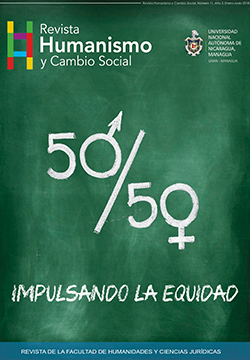Female political equality in Nicaragua: public strategy and social change during the 2007-2016 period.
DOI:
https://doi.org/10.5377/hcs.v0i11.8728Keywords:
Gender equality, women, social change, power, political participationAbstract
This article is the result of a documentary research. Thus, source documents of different nature, about female political equality in Nicaragua, specifically in its character of public national strategy, were analyzed from a qualitative point of view. The historical and cultural context in which Nicaraguan society interacts in the current political system is taken into account. Gender relations were a key factor in the study of political equality and thus, are an integral aspect of the analysis. The gender perspective became a fundamental analysis tool to facilitate a critical and cross-cutting view of gender and power relations. The main findings reflect that the structure of the national gender strategist during the period 2007-2016 is expressed in three central aspects: equality before the law through the approval and reforms of a set of laws in favor of women; affirmative actions expressed in the implementation of social programs and a gender cross-cutting national policy and part of the national human development plans, as well as, a wide presence and inclusion of women in different instances of the State.
Downloads
References
Asamblea Nacional (s.f). Comisiones Permanente. Recuperado de http://legislacion.asamblea.gob.ni/Tablas%20Generales.nsf/MainComisiones.xsp
Álvarez, A. (2015). Avances y desafíos del empoderamiento de las mujeres en Nicaragua. Managua: FIDEG.
Boletín el 19 Noticias. (9 de julio de 2010). Gobierno Sandinista ha marcado un hito histórico en la participación
de las mujeres en cargos públicos. Recuperado de http://www.nicaraguatriunfa.com/documetos_2010.html
Constitución Política de Nicaragua [Const.]. (1938). Managua: El Parlamento.
Decreto N° 36-2006 Del Programa Nacional de Equidad de Género. (16 de julio de 2006). Managua, Nicaragua: Diario Oficial La Gaceta. (139), 6168-6180.
Decreto No. 29-2010. Reglamento de la Ley No. 648. Ley de Igualdad de Derechos y Oportunidades. (28 de junio
de 2010). (121). Managua, Nicaragua: Diario Oficial La Gaceta.
Dulzaides, M., & Molina, M. (2004). Análisis documental y de información: dos componentes de un mismo
proceso. ACIMED, 12(2).
Durango, G. (2016). Las acciones afirmativas como mecanismos reivindicadores de la paridad de género en la.
Revista de Derecho (45), 137-168.
GRUN. (2008). Propuesta de la Política de Género. Documento Oficial, Managua.
GRUN. (2008). Plan Nacional de Desarrollo Humano 2012-2016. Managua.
GRUN. (2012). Plan Nacional de Desarrollo Humano 2012-2016. Managua.
Johnson, N., Rocha, C., & Schenck, M. (2013). Hacia una Democracia Paritaria: La Representación Política de las Mujeres. Montevideo: Cotidiano Mujer.
Ley 790. Ley de Reforma a la Ley No. 331, Ley Electoral. (23 de mayo de 2012). (91), 3742-3746. Managua,
Nicaragua: Diario Oficial La Gaceta.
Ley 779. Ley Integral Contra la Violencia hacia las Mujeres. (22 de febrero de 2012). Managua, Nicaragua: Diario Oficial La Gaceta.
Ley 648. Ley de Igualdad de Derechos y Oportunidades. (12 de marzo de 2008). Managua, Nicaragua: Diario Oficial La Gaceta.
MEFCCA. (4 de abril de 2016). Programa Hambre Cero. Recuperado de https://dds.cepal.org/eventos/presentaciones/2016/0418/Panel-I.7.NicaraguaCIdiaquez.pdf




